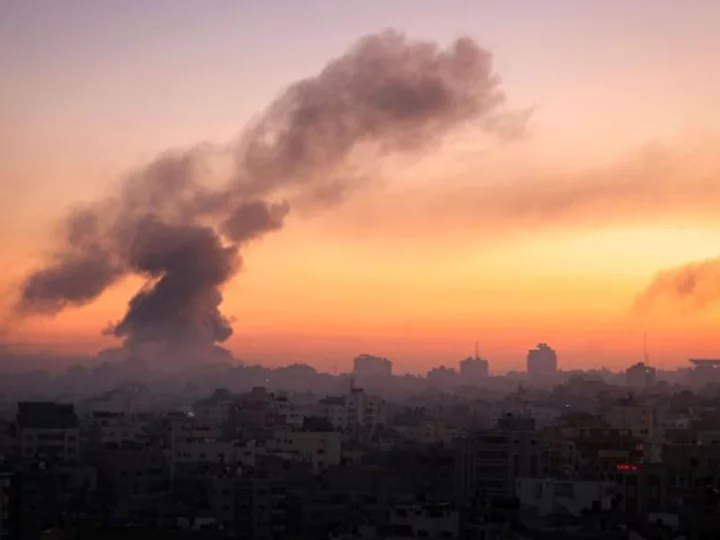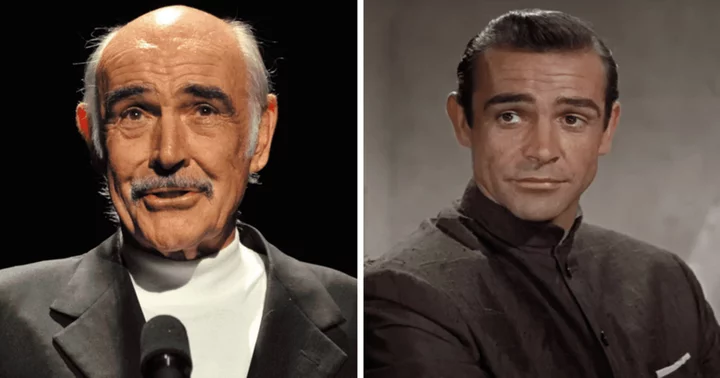In Columbus, Ohio, a 59-year-old cardiologist locked himself in his office to cry as he awaited news about his siblings and much of his extended family caught in the continual bombing in Gaza.
"It's just too much to see, too much to tolerate," Dr. Aref Abou-Amro said. "Just too much."
In Austin, Texas, a 47-year-old event production manager has mounted a one-man media campaign to try to find to find his aunt, his cousin and her two daughters, ages 2 and 4.
He did a double take, he said, at an online video showing the women and the girls being taken by militants during the unprecedented Hamas operation that quickly spiraled into the deadliest attack on Israel in 50 years.
"It's hard to sleep until you are absolutely exhausted," Dori Roberts said. "But our mission is to keep their story alive... until hopefully we learn they're free and back home."
For Israelis and Palestinians alike, the world has been upended in a matter of days. For them, along with anxious loved ones across the United States, a terrifying new reality is starting to set in: A sense of impending doom, loss and uncertainty.
"We're walking on that very thin line between madness and sanity... It's been a very hard, emotional journey," Roberts said.
'This is only the beginning'
It's been seven days since Hamas' massive assault on Israel, which killed more than 1,300 people and led to the capture of civilian and military hostages now believed to be held in Gaza.
The surprise attack saw waves of heavily armed Hamas fighters rampage through rural Israeli towns, kibbutzim and army bases. More than 100 people were taken hostage by militants.
Israel, in response, ordered a "complete siege" of Gaza, including cutting off food, water and fuel, while unleashing its heaviest ever airstrikes on the blockaded enclave.
"This is only the beginning," Israeli Prime Minister Benjamin Netanyahu said in a speech Friday night, adding, "We will destroy Hamas."
The Israel Defense Forces warned more than 1 million residents in northern Gaza to evacuate. It massed troops and military equipment at the border as relentless airstrikes rained down on the territory. Already, more than 400,000 Palestinians had been internally displaced in a week of fighting.
At least 2,215 Palestinians have been killed in Gaza from Israeli strikes, the Palestinian Ministry of Health said Saturday. That toll includes 724 children. A hospital in Gaza had to use ice cream trucks as makeshift morgues because of the growing number of bodies.
Sleepless nights, thousands of miles away
Thousands of miles from the carnage, in Ohio, Abou-Amro described the anguish of watching from afar as the already hard lives of his loved ones -- including three sisters and a brother who's a American citizen -- suddenly took a turn for the worse.
Three times, he said, one sister had been warned to move ahead of Israeli shelling — only to be told to move again after going to a place she thought was safe. Now, the sister, his 80-year-old brother and about 400 other people are camped out at a family property in Al-Zawida, a village around 10 miles south of Gaza City. Other relatives are sheltering elsewhere. They are constantly on the move. He described watching the TV news and scrolling web pages.
"We see these images. You cannot imagine how painful these are. And then I sit in my office, just crying, and thinking of these kids and then my kid -- just so sad," said Abou-Amro, an American citizen who left Gaza in 1982 and moved to US in 1991. "We had wars in Gaza ... before but nothing like this. We have never seen something like today."
Abou-Amro and others spoke of sleepless nights that leave their eyes red from exhaustion and worry. They described the despair after each futile attempt to reach loved ones.
"I had some patients to see and my manager came to me... and he said, 'You look tired. What can I do?' For me, that support is enough. I find it easier for me to work a bit than to sit and watch the news," he said.
On Friday he shut the door to his office for a moment to cry.
"I just couldn't handle it," he said. "Really, you know, it's just too much. These people, innocent people living there — they did nothing wrong. They want to live and they want to live like us. They want to be healthy, have a good future, have a good life. They love life and they want to live."
Communication is rare -- and brief
In Chicago, 34-year-old health care data scientist Yahia Abuhashem thinks of nothing but his parents, four siblings, and 12 nephews and nieces back in Gaza.
"It's been the most difficult week of my entire life and probably theirs too," said Abuhashem, who moved to the US 15 years ago and earned a PhD in applied economics. "I have not slept. I haven't been able to work. Every day is harder and more unimaginable than the day before."
His relatives are now scattered in three different neighborhoods in Gaza.
"My sister went and stayed with my other sister, and between them they have five to six kids," Abuhashem said. "And then one of my brothers took my dad and my other brother took my mom. My parents are 70 years old."
It's hard to keep track of their whereabouts, he said. Communication is spotty. Some days, Abuhashem said, he spends hours trying to make contact and, when he finally reaches them, they only speak for a few seconds to conserve power on their phones.
"You're just like, 'Hey, everyone alive? Everyone alive. Okay.' That's literally it," he said. "That's as good as it gets over there right now -- just to be alive. There's no time to ask whether mom has her medicine or she has batteries for her hearing aid."
Abuhashem, who recently became a US citizen, said his heart is constantly pounding "like it's going to explode."
"I have a five-month-old daughter that I haven't paid any attention to since Friday night. Every time I see her I break down. I immediately think of all these images of babies in pieces."
Loved one's mission 'to bring them back home'
In Austin, Roberts, the event production manager, said he is solely focused on getting out the story of his 67-year-old aunt, Efrat Katz, his 34-year-old cousin, Doron Katz Asher, and her two daughters, Aviv and Raz. A week ago he received a video posted to social media showing the two women and the girls being taken hostage by militants in the southern Israel kibbutz of Nir Oz.
"She looked so horrified, confused and shocked," he said of his aunt in the video.
His aunt's 79-year-old partner and another relative also were taken hostage, Roberts said.
"Those endless thoughts about, 'Where are they? How are they doing? What are they going through every minute of the day?' That can really drive you insane," said Roberts.
"You wake up with nightmares. You always have their face in your mind. Your trying to stay away from the videos popping up on social media."
Roberts said he was in Israel a couple of months ago for his mother's funeral and his aunt, his cousin and the two girls, and other relatives surrounded him with support.
"I talk to my family, to my two girls about what's going, and we're just understanding the magnitude of this thing. It's just so overwhelming," said Roberts, who has been speaking virtually nonstop to media outlets about his family and the other hostages. "Our mission now is to bring them back home."
'Despair, horror, helplessness'
In Massachusetts, Jason Greenberg recalled that it was just one week ago that he was in Israel visiting his father, sister and other relatives when he awoke to sirens just north of Tel Aviv.
Later that Saturday morning, there was a flurry of text messages between Greenberg's aunt, Carmela Dan, and her children.
Dan, 80, her 50-year-old son-in-law and three of her grandchildren -- ages 12 to 16 -- had taken shelter in their home in Nir Oz just a few miles from the border with Gaza.
"They had gone to their shelter and their safe room and that they heard gunfire, and they heard shouting. And ... they smelled smoke," Greenberg said of the messages.
One last message read: "We hear them. They're coming."
The family's house was set ablaze, Greenberg said. They were taken hostage.
His five family members -- four cousins and his aunt -- stopped responding to the family's WhatsApp group at some point. A 22-second video later surfaced of his 12-year-old cousin being abducted by Hamas.
The children's mother was not with the family at the time, Greenberg said.
With the situation in Israel escalating, Greenberg said, he managed to book a flight to Rome the next morning. He took his 79-year-old father, who is a dual US-Israeli citizen, with him to Massachusetts.
"Despair, horror, helplessness," Greenberg said of how he felt after learning about the fate of his family members.
"I wish I could say that there was hopefulness or any optimism, but that's just not the case. From from the outset, I just wasn't really able to see a silver lining or this ending well for them."









